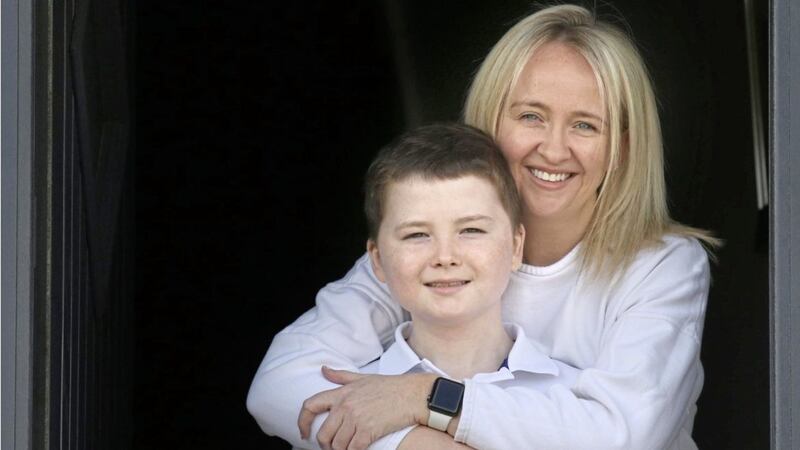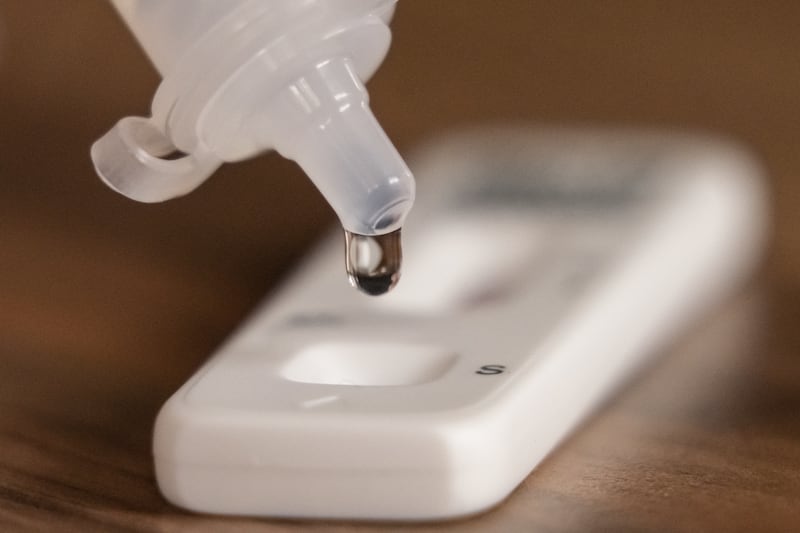WHILE many people are struggling to adapt to a new way of life under lockdown, for the Magills of Glengormley, it's familiar territory.
Certain practices such as social distancing, deep cleaning and constant washing of hands were part of the family's daily routine after second-eldest child Reece (11) was diagnosed with leukaemia in April 2017.
For six months Reece, who was just eight at the time of his diagnosis, remained in the Royal Belfast Hospital for Sick Children. Chemotherapy weakened his immune system, leaving him vulnerable to infections. His parents Jolene and Michael took every step possible to protect their little boy.
“When Reese was first diagnosed he was extremely ill and reacted to everything,” says Jolene. “We didn't get to take him home, only for a couple of hours occasionally. He spent ages in hospital and we were so nervous about him picking up bugs or germs, we wouldn't let anyone see him for the first month.
“We had no idea what the protocol was but we just knew we had to keep him safe. We wouldn't even let his grandparents visit him those first four weeks. When we did eventually let them in, we made sure they cleaned their hands before entering the ward, then cleaned them again, before entering his room. We just couldn't take any risks at all.”
Reece's older sister Nicole and two younger brothers, Jude and Flynn, weren't permitted to visit him either. The potential for the children to be transmitters of germs was just too great and, for a time, Reece could only communicate with his siblings via Face-time. And that was when he felt well enough to lift his head off the pillow.
As a result of the chemotherapy, Reece's thick, healthy hair fell out and Jolene can still remember the impact that had on her youngest son Flynn, when he saw his brother for the first time post-treatment.
“Flynn is autistic and has ADHD and he just couldn't understand why Reece was bald,” says Jolene. “He hadn't seen him for weeks so we let them Face-time. Flynn freaked out a bit because he wasn't used to seeing his brother like that. All we could do was explain to him that Reece was very ill.”
During those initial first few weeks, Jolene barely left Reece's hospital bedside. While Michael divided his time between the hospital and home, Jolene maintained a vigil. She ate in the hospital, slept and showered there. She recalls going out into the sunlight for the first time after being cocooned in a hospital room.
“The sun was so bright in my eyes,” she says. “I felt like a vampire.”
When Reece's grandparents were given the all-clear to visit, Jolene and Michael kept tight restrictions in place – constant use of hand sanitiser, no cuddling or hugging, no sitting too close to the bed. Social distancing was vital to keep their boy safe.
Back at home Jolene ramped up her cleaning routine to prepare for his hospital discharge. The house was disinfected throughout. Floors were scrubbed, door handles wiped down and old mattresses and bed linen replaced with new.
“I became manic about cleaning,” Jolene says. “I probably developed OCD, if I'm being honest. I didn't want anyone coming to the house where they could possibly infect him, though after a while, I let one or two of his friends in.
“I adopted really tough measures to protect him but as far as we were concerned, it had to be done.”
Taking every precaution necessary to keep Reece safe led to a spike in Jolene's anxiety levels. A more than capable person who had never struggled with mental health problems before, she found it difficult to sleep and lost a lot of weight.
After a few months of having him home, both she and Michael were able to relax slightly. Reece's pals were allowed to see him one at a time, to play on the Xbox. Jolene called up each child's parents to inquire if there was any illness in the family and asked the boys to remove their coats and shoes once they entered the house.
“I was so paranoid about one of his friends having a vomiting bug or a cold or a cough,” she says. "My other sons missed out too because I wouldn't let them go to birthday parties or play with groups of friends in case they picked something up.
“He got out of hospital in September and on Christmas Day we had our family over to join us for dessert. I think that was the first time we managed to relax a bit.”
Three years on from his diagnosis, Reece is now in the maintenance stage of his cancer journey. He takes an oral chemotherapy treatment every day and once a month receives an injected form of chemotherapy as well as steroids.
The coronavirus outbreak has naturally stirred up a lot of anxious feelings for his parents and Jolene says that once again, they find themselves practising social distancing and self-isolation; except this time the fear is greater.
“Four weeks ago, Michael took sick with a flu,” Jolene says. “It wiped him out. He'd never experienced anything like it before. We hadn't gone into lockdown at that stage but we weren't taking any risks. We sent Reece to my mum and dad's. He was having a great time, being spoiled rotten by them, but I was sitting at home, really anxious.
“We phoned the hospital and were told Michael needed to self-isolate so he went and stayed in the loft until he was better. Even the flu can be extremely dangerous to Reece. He's had his flu jab but still, we weren't taking any chances.
“Reece is back home now and we've had no-one in the house since then. My sister and a friend do our shopping. If I do have to pop out to pick up a loaf or milk, I wear gloves and a mask and take my hand sanitiser. The moment I get back, I strip off and take a shower.
“I've always been careful since Reece took ill and the kids all know to wash their hands and use sanitisers. At one stage, Reece was so sick he had 21 machines keeping him alive and was in intensive care for four weeks. It was terrifying. We never want to go back there again.”
Jolene is now urging the public to pay heed to expert and government advice to stay home and stay safe.
“There are so many vulnerable people in this world who don't have the strength to fight the coronavirus,” she says. “My boy is due to ring the bell to celebrate the end of his treatment in September. We want him to get there.
“He's battled cancer now three years. He hasn't gone through all this hell for the coronavirus to get him. So please do the right thing.”
Felix Mooney, chairman of the Children's Cancer Unit Charity, says: “It is critical that any child receiving treatment for cancer is kept from any harm, germs or risk of infection, so for families affected by childhood cancer, the stringent public health measures we all now must undertake are nothing new."
“These families have engaged in these practises for many months, if not years, and they're particularly anxious that all of us take special precautions at this time.
“Like other charitable and health organisations, the Children's Cancer Unit Charity is reiterating the advice given by officials and calling on the public to be responsible and to strictly follow the guidance. Frequent hand washing and keeping away from each other as best we can – these simple steps could be the difference in protecting a sick child and putting them at risk.”








